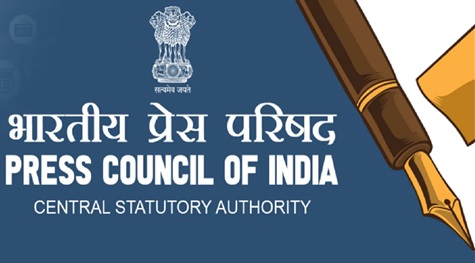(Prelims: Important Commissions and Institutions)
(Mains, General Studies Paper- 2: Governance, Constitution, Governance, Statutory, Regulatory and Various Quasi-Judicial Bodies) |
Reference
Lok Sabha Speaker Om Birla has nominated three members of the House, Sambit Patra (Bharatiya Janata Party/Puri-Odisha), Naresh Mhaske (Shiv Sena/Thane-Maharashtra) and Kali Charan Munda (Indian National Congress/Khunti-Jharkhand) to the Press Council of India.
About the Press Council of India

- Introduction: It is a statutory, quasi-judicial and autonomous authority.
- Establishment: It was re-established in the year 1979 under the Press Council Act, 1978 of the Parliament.
- Earlier, it was established on 4 July 1966 on the recommendations of the first Press Commission under the Press Council Act, 1965. During the Emergency in 1975, this Act was repealed and the Council was dissolved.
- A new Act was made with the same objective as the Act of 1965.
- Objective: Under Section 13 of the Press Council Act, 1978, the Council has two main objectives-
- To protect the freedom of the press
- To maintain and improve the standards of newspapers and news agencies in India
Composition of the Council
- Chairman: The Council is a permanent body consisting of a Chairman and 28 members. The Chairman is traditionally a retired judge of the Supreme Court of India.
- Selection Committee: The Chairman is nominated (selected) by a committee consisting of the Chairman of the Rajya Sabha, the Speaker of the Lok Sabha and a person elected by the 28 members of the Council.
- Members: The Council has a total of 28 members
- 13 Working Journalists: These include editors of 6 newspapers and 7 other working journalists.
- 6 Management Representatives: 2 representatives each from big, medium and small newspapers.
- They are in the business of managing newspapers or are their owners.
- 1 News Agency Representative: A person who manages news agencies.
- 5 Parliamentary Representatives: 3 members nominated by the Speaker of Lok Sabha and 2 members nominated by the Chairman of Rajya Sabha representing the interests of readers.
- 3 Other Representatives: Members nominated from University Grants Commission (UGC), Bar Council of India and Sahitya Akademi represent the fields of education, law and literature respectively.
- Tenure: The tenure of the Chairman and members is 3 years.
Major Functions of the Council
- Mission of the Press Council of India To assist newspapers and news agencies in maintaining their independence
- To frame code of conduct for newspapers, news agencies and journalists in accordance with high professional standards
- To ensure that high standards of public interest are maintained by newspapers, news agencies and journalists and to promote proper awareness of rights and responsibilities
- To review any developments which tend to restrict the supply and dissemination of news of public interest and importance
- To promote proper functional relationship between all sections of persons engaged in the production or publication of newspapers or news agencies
- To note developments such as concentration of ownership or other aspects of newspapers and news agencies which may affect the freedom of the press
Discharge of Functions
- The Council discharges its functions mainly by adjudicating on complaints received by the Council. These complaints are either against the press for violation of journalistic principles or interference in its freedom by the press.
- Where the Council is satisfied, after an inquiry, that a newspaper or a news agency has violated the standards of journalistic ethics or has committed an offence against public interest or that an editor or working journalist has committed any professional misconduct, the Council may warn or censure them or express disapproval of their conduct.
- The Council is also empowered to make such comments as it may deem fit on any interference by any authority including the Government with the freedom of the press as specified under section (4). The decision of the Council is final and cannot be challenged in any court.
Financing
- Being a body constituted under an Act of Parliament, the Council receives major portion of its funds as grants-in-aid from the Central Government after due appropriation by the Parliament.
- However, it has its own funds also which are collected by way of fees from the newspapers according to their structural grade and by other receipts.